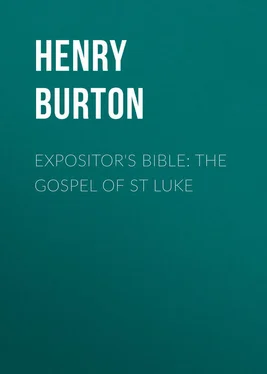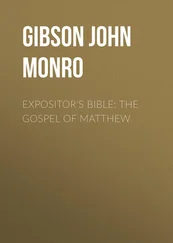Henry Burton - Expositor's Bible - The Gospel of St Luke
Здесь есть возможность читать онлайн «Henry Burton - Expositor's Bible - The Gospel of St Luke» — ознакомительный отрывок электронной книги совершенно бесплатно, а после прочтения отрывка купить полную версию. В некоторых случаях можно слушать аудио, скачать через торрент в формате fb2 и присутствует краткое содержание. Издательство: Иностранный паблик, Жанр: foreign_religion, foreign_antique, foreign_prose, на английском языке. Описание произведения, (предисловие) а так же отзывы посетителей доступны на портале библиотеки ЛибКат.
- Название:Expositor's Bible: The Gospel of St Luke
- Автор:
- Издательство:Иностранный паблик
- Жанр:
- Год:неизвестен
- ISBN:нет данных
- Рейтинг книги:3 / 5. Голосов: 1
-
Избранное:Добавить в избранное
- Отзывы:
-
Ваша оценка:
- 60
- 1
- 2
- 3
- 4
- 5
Expositor's Bible: The Gospel of St Luke: краткое содержание, описание и аннотация
Предлагаем к чтению аннотацию, описание, краткое содержание или предисловие (зависит от того, что написал сам автор книги «Expositor's Bible: The Gospel of St Luke»). Если вы не нашли необходимую информацию о книге — напишите в комментариях, мы постараемся отыскать её.
Expositor's Bible: The Gospel of St Luke — читать онлайн ознакомительный отрывок
Ниже представлен текст книги, разбитый по страницам. Система сохранения места последней прочитанной страницы, позволяет с удобством читать онлайн бесплатно книгу «Expositor's Bible: The Gospel of St Luke», без необходимости каждый раз заново искать на чём Вы остановились. Поставьте закладку, и сможете в любой момент перейти на страницу, на которой закончили чтение.
Интервал:
Закладка:
But in saying all this we do not say that Heaven is unobservant of earthly times and seasons. They are a part of the Divine order, stamped on all lives, on all worlds. Our days and nights keep their alternate step; our seasons observe their processional order, singing in antiphonal responses; while our world, geared in with other worlds, strikes off our earthly years and days with an absolute precision. So, now, the time of the Advent has been Divinely chosen, for whole millenniums unalterably fixed; nor have the cries of Israel's impatient hopes been allowed to hurry forward the Divine purpose, so making it premature. But why should the Advent be so long delayed? In our off-handed way of thinking we might have supposed the Redeemer would have come directly after the Fall; and as far as Heaven was concerned, there was no reason why the Incarnation and the Redemption should not be effected immediately. The Divine Son was even then prepared to lay aside His glories, and to become incarnate. He might have been born of the Virgin of Eden, as well as of the Virgin of Galilee; and even then He might have offered unto God that perfect obedience by which the "many are made righteous." Why, then, this strange delay, as the months lengthen into years, and the years into centuries? The Patriarchs come and go, and only see the promise "afar off." Then come centuries of oppression, as Canaan is completely eclipsed by the dark shadow of Egypt; then the Exodus, the wanderings, the conquest. The Judges administer a rough-handed justice; Kings play with their little crowns; Prophets rebuke and prophesy, telling of the "Wonderful" who shall be; but still the Messiah delays His coming. Why this strange postponement of the world's hopes, as if prophecy dealt in illusions only? We find the answer in St. Paul's Epistle to the Galatians (chap. iv. 4). The "fulness of the time" was not yet come. The time was maturing, but was not yet ripe. Heaven was long ago prepared for an Incarnation, but Earth was not; and had the Advent occurred at an earlier stage of the world's history, it would have been an anachronism the age would have misunderstood. There must be a leading up to God's gifts, or His blessings cease to be blessings. The world must be prepared for the Christ, or virtually He is no Christ, no Saviour to them. The Christ must come into the world's mind as a familiar thought, He must come into the world's heart as a deep-felt need, before He can come as the Word Incarnate.
And when is this "fulness of the time"? "In the days of Herod, king of Judæa." Such is the phrase that now strikes the Divine hour, and leads in the dawn of a new dispensation. And what dark days were those to the Hebrew people, when on the throne of their David sat that Idumean shadow of the dread Cæsar! Their land swarms with Gentile hordes, and on the soil devoted to Jehovah rise stately, splendid temples, dedicated to strange gods. It is one irruption of Paganism, as if the Roman Pantheon had emptied itself upon the Holy Land. Nay, it seemed as if the Hebrew faith itself would become extinct, strangled by heathen fables, or at any rate that she would survive, only the ghost of her other self, walking like an apparition, with veiled face and sealed lips, amid the scenes of her former glories. "The days of Herod" were the Hebrew midnight, but they give us the Bright and Morning Star. And so upon this dial-plate of Scripture the great Herod, with all his royalties, is nothing more than the dark, empty shadow which marks a Divine hour, "the fulness of the time."
Israel's corporate life began with four centuries of silence and oppression, when Egypt gave them the doubled task, and Heaven grew strangely still, giving them neither voice nor vision. Is it but one of the chance repetitions of history that Israel's national life should end, too, with four hundred years of silence? for such is the coincidence, if, indeed, we may not call it something more. It is, however, just such a coincidence as the Hebrew mind, quick to trace resemblances and to discern signs, would grasp firmly and eagerly. It would revive their long-deferred and dying hopes, overlaying the near future with its gold. Possibly it was this very coincidence that now transformed their hope into expectation, and set their hearts listening for the advent of the Messiah. Did not Moses come when the task was doubled? And was not the four hundred years' silence broken by the thunders of the Exodus, as the I AM, once again asserting Himself, "sent redemption to His people"? And so, counting back their silent years since Heaven's last voice came to them through their prophet Malachi, they caught in its very silences a sound of hope, the footfall of the forerunner, and the voice of the coming Lord. But where, and how, shall the long silence be broken? We must go for our answer – and here, again, we see a correspondence between the new Exodus and the old – to the tribe of Levi, and to the house of Amram and Jochebed.
Residing in one of the priestly cities of the hill-country of Judæa – though not in Hebron, as is commonly supposed, for it is most unlikely that a name so familiar and sacred in the Old Testament would here be omitted in the New – was "a certain priest named Zacharias." Himself a descendant of Aaron, his wife, too, was of the same lineage; and besides being "of the daughters of Aaron," she bore the name of their ancestral mother, "Elisabeth." Like Abraham and Sarah, they were both well advanced in years, and childless. But if they were not allowed to have any lien upon posterity, throwing themselves forward into future generations, they made up the lack of earthly relationships by cultivating the heavenly. Forbidden, as they thought, to look forward down the lines of earthly hopes, they could and did look heavenward; for we read that they were both "righteous" – a word implying a Mosaic perfection – "walking in all the commandments and ordinances of the Lord blameless." We may not be able, perhaps, to give the precise distinction between "commandments" and "ordinances," for they were sometimes used interchangeably; but if, as the general use of the words allows us, we refer the "commandments" to the moral, and the "ordinances" to the ceremonial law, we see how wide is the ground they cover, embracing, as they do, the (then) "whole duty of man." Rarely, if ever, do the Scriptures speak in such eulogistic terms; and that they should here be applied to Zacharias and Elisabeth shows that they were advanced in saintliness, as well as in years. Possibly St. Luke had another object in view in giving us the portraits of these two pre-Advent Christians, completing in the next chapter the quarternion, by his mention of Simeon and Anna. It is somewhat strange, to say the least, that the Gentile Evangelist should be the one to give us this remarkable group – the four aged Templars, who, "when it was yet dark," rose to chant their matins and to anticipate the dawn. Whether the Evangelist intended it or not, his narrative salutes the Old, while it heralds the New dispensation, paying to that Old a high though unconscious tribute. It shows us that Hebraism was not yet dead; for if on its central stem, within the limited area of its Temple courts, such a cluster of beautiful lives could be found, who will tell the harvest of its outlying branches? Judaism was not altogether a piece of mechanism, elaborate and exact, with a soulless, metallic click of rites and ceremonies. It was an organism, living and sentient. It had nerves and blood. Possessed of a heart itself, it touched the hearts of its children. It gave them aspirations and inspirations without number; and even its shadows were the interpreters, as they were the creations, of the heavenly light. And if now it is doomed to pass away, outdated and superseded, it is not because it is bad, worthless; for it was a Divine conception, the "good" thing, preparing for and proclaiming God's "better thing." Judaism was the "glorious angel, keeping the gates of light;" and now, behold, she swings back the gates, welcomes the Morning, and herself then disappears.
Читать дальшеИнтервал:
Закладка:
Похожие книги на «Expositor's Bible: The Gospel of St Luke»
Представляем Вашему вниманию похожие книги на «Expositor's Bible: The Gospel of St Luke» списком для выбора. Мы отобрали схожую по названию и смыслу литературу в надежде предоставить читателям больше вариантов отыскать новые, интересные, ещё непрочитанные произведения.
Обсуждение, отзывы о книге «Expositor's Bible: The Gospel of St Luke» и просто собственные мнения читателей. Оставьте ваши комментарии, напишите, что Вы думаете о произведении, его смысле или главных героях. Укажите что конкретно понравилось, а что нет, и почему Вы так считаете.












